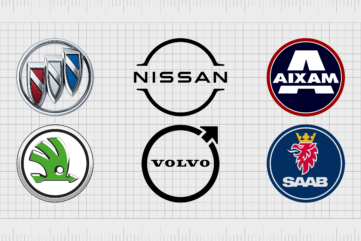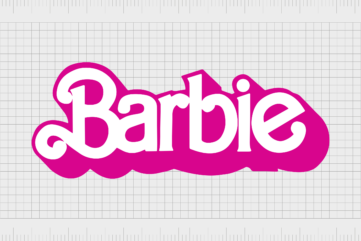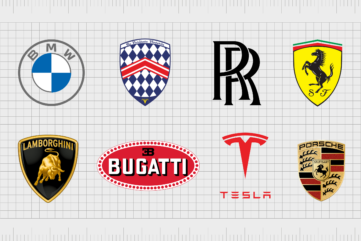The largest acquisitions and biggest mergers of all time (the top 19 examples)
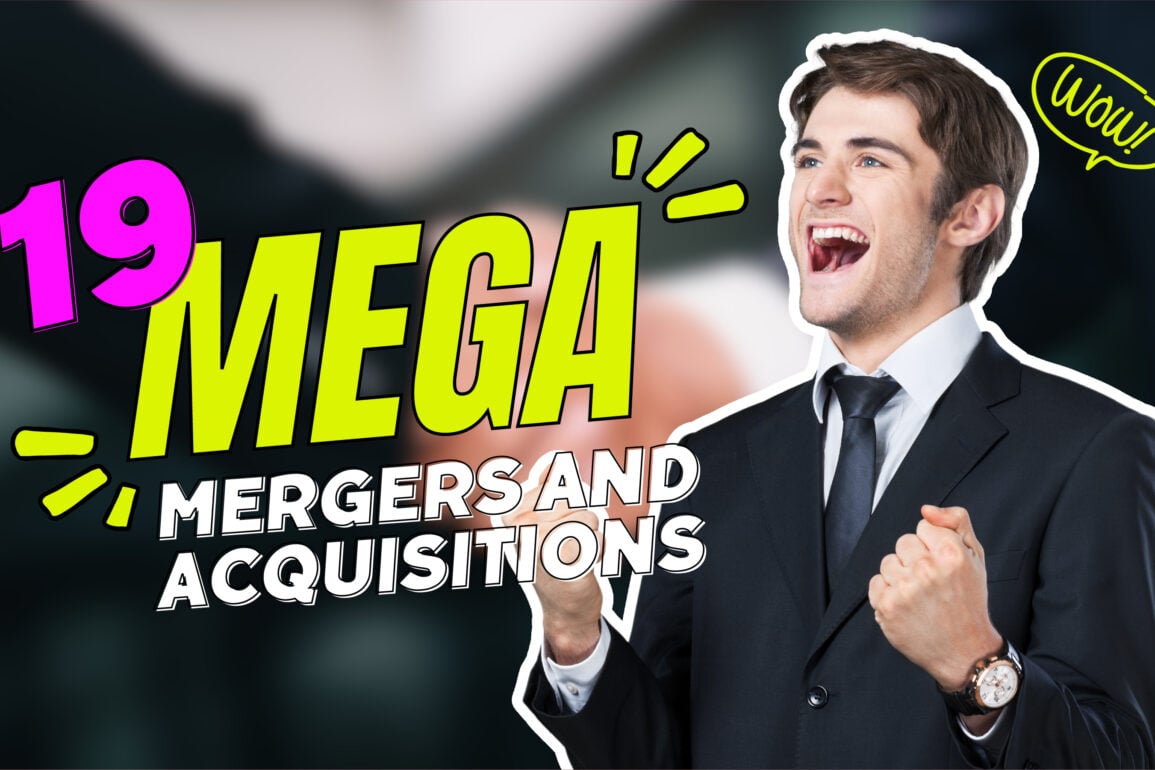
The largest acquisitions and biggest mergers of all time have an important lesson to teach us. Bigger doesn’t always mean better. While a major deal definitely gets investors and consumers excited, the companies that spend a fortune on M&A strategies aren’t guaranteed to thrive.
That doesn’t mean all of the famous mergers and acquisitions through history have led to failure, of course. Some big deals really were worth the cash. But every company, large or small, should have a strategy when it comes to M&A activity.
Fortunately, looking back over the biggest mergers and acquisitions of the last few years can be a good exercise for evolving brands – even if you’re just trying to learn what not to do.
Today, we’re going to take a jaunt through history, looking at some of the most eye-watering deals ever established between major companies.

Famous mergers and acquisitions: What’s the difference?
Let’s start with a little clarity.
The terms “merger” and “acquisition” are often pretty misunderstood. After all, they’re so frequently used together, it’s easy to assume they mean the same thing.
There’s definitely some overlap. A merger deal or acquisition agreement both bring two companies together in unity. But what happens after the transfer of funds is very different.
A merger happens when two separate entities join forces to create a new company. One brand doesn’t swallow the other. Instead, a brand-new organization is formed, though it might sell the same products and services of the previous two companies.
For example, Exxon Corp and Mobil Corp completed a merger in 1999, after asking for approval from the Federal Trade Commission. The collaboration resulted in the restructuring of a new combined entity, and the adoption of a new name: “Exxon Mobil Corp”.
An acquisition, on the other hand, involves the “hostile takeover” of one company by another. We say “hostile”, but it’s worth noting that one company generally pays a lot of cash to obtain another.
With an acquisition, one organization takes over all of the intellectual property, customers, and assets of the other brand. While the company might keep the name of the other entity, they now make all the decisions.
For instance, AT&T bought Time Warner in 2019, and created the new “WarnerMedia” business, which eventually merged with Discovery.
The biggest mergers of all time: Examples of mergers
With that explanation out of the way, it’s time to look at some of the largest mergers that have ever taken place. Once again, we should point out that we’re looking at the “biggest mergers” here – not the most successful. That’s a story for an entirely different article.
By “biggest” we generally mean most expensive or impactful. We’re talking about mergers that resulted in a heck of a lot of money trading hands, as well as a huge number of assets.
Let’s dive in.

1. America Online (AOL) and Time Warner ($182 billion)
Let’s start with the granddaddy of major mergers. The AOL and Time Warner Merger is considered one of the biggest, and most famous mergers of all time. It’s also, unfortunately, one of the least successful mergers ever established.
Taking place at the height of the dotcom era (dotcom bubble) in 2000, this merger involved a successful internet provider (AOL) bidding to acquire the mass media conglomerate, Time Warner.
AOL already had a huge market share at the time, but it wanted to branch out with Time Warner’s presence in entertainment, publishing, and news.
Unfortunately, the two companies clashed in terms of management style and culture, leading to a problematic working environment. When the dotcom bubble burst, the value of AOL stock plummeted, and the merger broke apart.
Though the merger fell apart after just a couple of months, it was officially deconstructed in 2009.

2. Suez and Gaz de France ($182 billion)
Tying for the number one spot on this list, we have Suez and Gaz de France, and Suez. The merger went through quite a lot of twists and turns before it created the European water, energy, and environmental giant, “GDF Suez”.
One of the main reasons the merger generated such controversy is that the European Commission and trade unions were heavily opposed to the plan. GDF Suez management had to promise not to make any employees redundant at the end of the deal.
The president of France at the time, Nicholas Sarkozy even had to step in to save the merger, playing a role as a part-time investment banker.
Despite its issues, the deal created the world’s fourth biggest energy company, and the second largest electricity and gas group in Europe.

3. Dow Chemical and DuPont ($130 billion)
A little more recent, the Dow Chemical and DuPont merger was announced in 2015, and took around 2 years to complete. This “merger of equals” grabbed a lot of attention from the media.
Business leaders and analysts knew the two chemical companies joining forces would create one of the largest corporations in the world, eliminating the competition. It led to the development of a highly-focused set of businesses in agricultural, material science, and more.
Experts believed the merger would deliver around $1 billion in growth, and $3 billion in cost synergies. Fortunately, the mega deal seemed to pan out.
By 2018, the combined company was already earning around $86 billion a year. However, a year later, the merged company decided to split into three separate entities, all with their own focus.

4. United Technologies and Raytheon ($121 billion)
Another so-called “merger of equals”, The collaboration between United Technologies and Raytheon was designed to create the most advanced defense systems and aerospace provider in the world.
Each company was already a major player in their market, making this one of the biggest deals in the industry. The deal closed in the first half of 2020, and a new name was established for the brand: “Raytheon Technologies Corporation”.
We’re still waiting to see the full impact of this merger, but in 2022, Raytheon technologies did report some positive growth. They earned sales of $67.1 billion, and said their cash flow “exceeded expectations”.
Overall, most experts agree this was a pretty good deal. Raytheon can leverage United Tech’s experience in high temperature materials for jet engines to really turbocharge the defense space.
Still, the merged companies did see a dip in stock prices of around 25% after the deal closed.
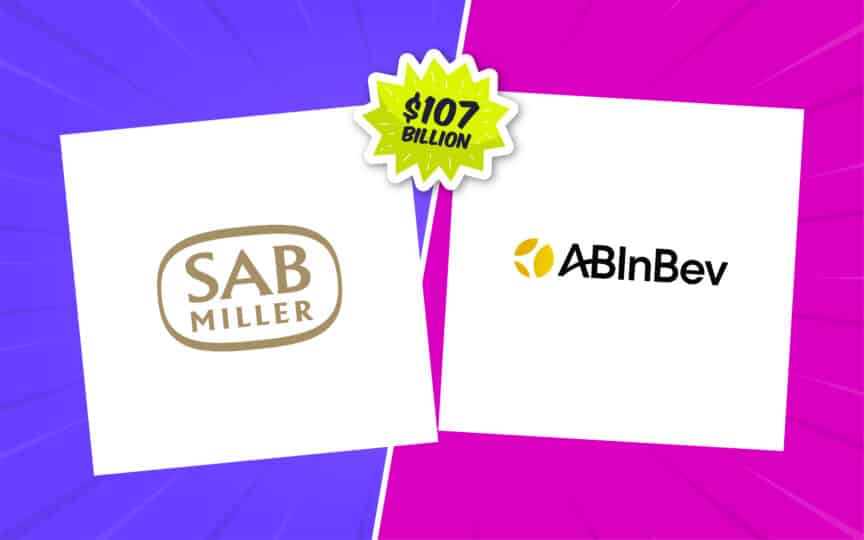
5. SABMiller and Anheuser-Busch InBev (AB InBev) ($107 billion)
Heading over to the beer industry for a moment, we have probably one of the biggest mergers in the beverage landscape. On paper, this deal looked like a fantastic idea.
After all, it involved two of the world’s biggest brewers coming together to bring some of the world’s favorite products into a single ecosystem. The deal brought Budweiser, Stella Artois, Corona, and Castle Lager together, all with the intent of reaching a larger market.
There was just one problem, at the same time the merger closed, the market for beer products was changing. Craft beers were overtaking popular names in the beverage industry.
Although the new company “AmBev” is pretty successful today, it did need to purchase a number of craft beer sellers to get back on track.
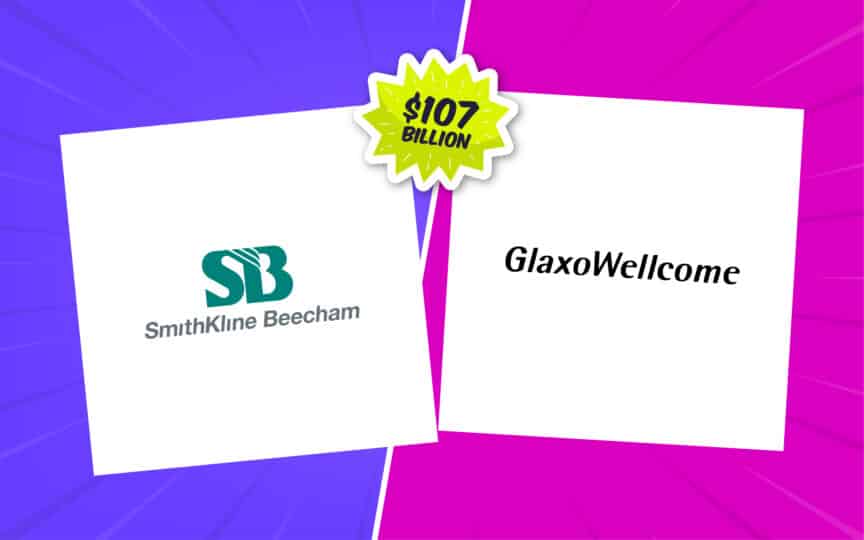
6. SmithKline Beecham and Glaxo Wellcome ($107 billion)
We’re not just looking at the largest mergers in US history here. Major British brands have a part to play in the M&A landscape too. The merger of two of the UK’s biggest pharmaceutical companies in 2000 created one of the largest medical brands in the world.
Once again, there wasn’t really anything wrong with this deal on paper (other than the hefty price tag). However, investors didn’t seem to approve of the deal.
Some saw the merger as a little rushed, and stock prices took a dive as a result. The newly created company “GSK” invested in a few additional acquisitions to re-attract the attention of investors, and fuel their plan for innovation.
Fortunately, financial reports from the brand have shown positive growth in the last couple of years. This deal may not be doomed after all.

7. Kraft Foods Group and H.J Heinz ($100 billion)
We’re all familiar with the mega umbrella brand, the Kraft Heinz Company. But these two entities weren’t always part of the same group. When the two companies decided to join forces in 2015, they wanted to create the biggest food company in the United States – maybe even the world.
The merger deal brought leading household brands like Capri Sun, Heinz Ketchup and Philadelphia together in a new entity, leading to increased revenues of around $28 billion.
Though the mega-deal was considered a major success by some, others (particularly investors) saw it differently. Stock prices plummeted, thanks in part to a strict cost-cutting regime.
Currently, the combined companies expect to see a growth in organic net sales of 4-6% by the end of 2023, compared to the previous year.

8. Shell and Royal Dutch Petroleum ($95 billion)
A bit of an unusual entry to our list of the biggest mergers and acquisitions comes from Shell and Royal Dutch Petroleum. Previously, both of these companies had operated under the same parent brand before they split into two separate entities.
Each one also held stock in a pre-existing company known as “Royal Dutch Shell”. The merger in 2004 simply brought the two separate companies back together in harmony.
It was an expensive deal, but it made a lot of sense at the time. It reduced all the different layers of management in the company, and helped the organization to boost its asset base.
Plus, the timing was excellent. The two organizations re-joined forces just before oil hit its historic highs (prior to the financial crash in 2008). The combined company is now one of the biggest European gas and oil companies ever created.

9. Exxon and Mobil ($81 billion)
Way back in the late 90s, Exxon Corp and Mobil Corp agreed to a merger valued at around $81 billion at the time. It was considered one of the biggest mergers in history at the time, bringing together the top two US oil companies.
Unfortunately, there was some controversy around the deal. A huge number of employees lost their jobs as the combined companies worked to reduce expenses.
The new “Exxon Mobile Corp” also needed to overcome a number of cultural differences, which is never easy. Despite this, Exxon and Mobil’s merger stands as one of the largest M&A deals in history, and one of the most successful.
The largest acquisitions ever: Examples of acquisitions
Now we’ve covered some of the world’s largest mergers, let’s dive into our overview of some of the biggest acquisitions of all time. Remember, with acquisitions, a company’s assets, customer base, and holdings are all transferred to a completely different organization.
Let’s jump in.

1. Mannesmann and Vodafone ($202.8 billion)
Considered the largest acquisition of all time, Vodafone and Mannesmann’s deal has made headlines for years. The purchase, valued at $203 billion allowed phone company Vodafone to take over a German owned industrial conglomerate company.
The deal might have seemed odd, but it made sense for Vodafone. As the mobile market continued to gain momentum, the acquisition was expected to reshape the telecommunications space forever.
Vodafone quickly became the world’s largest mobile operator, and the acquisition set the scene for a ton of mega deals in the telecommunications space going forward.
Unfortunately, the deal turned out to be a flop, forcing Vodafone to write off billions of dollars in the years to come.

2. Vodafone and Verizon ($130 billion)
Clearly, Vodafone isn’t afraid of spending money to make money. The company has been involved in a huge number of deals over the past 20 years, including a major acquisition deal with Verizon.
In 2013, Verizon communications purchased assets from Vodafone to grow the “Verizon Wireless” ecosystem. From Verizon’s perspective, it gained full ownership over its division, ending a complicated relationship with Vodafone that had lasted for more than a decade.
This also led to the end of Vodafone’s journey in the US telecom market. However, Vodafone investors pocketed around $87 billion as a result of the deal.
Vodafone moved from being the second largest company in the world, to the fourth, falling behind Verizon, AT&T, and China Mobile.

3. Time Warner and AT&T ($108 billion)
After unsuccessful mergers in the past, Time Warner continued to remain active in the M&A space. In 2018, AT&T, the leading communications company, announced it had officially completed its acquisition of the Time Warner conglomerate.
The acquisition brought global media and entertainment giants like Warner Bros, HBO and Turner under the AT&T umbrella, giving the brand a new opportunity to span into new markets.
According to AT&T, the acquisition was intended to give the company a new avenue into the growing worlds of premium content and direct to customer distribution, with the added bonus of access to AT&T’s leading high-speed networks.
The results of the acquisition seem positive, with profits for AT&T increasing in recent years. Though it remains to be seen how things will shake out in the long-term.

4. RFS Holdings and ABN Amro ($98 billion)
One of the largest Dutch banks, ABN Amro had a fantastic presence in the financial market. It also took part in a number of mergers and acquisitions throughout history, which helped to accelerate some of its growth.
In 2007, RFS Holdings officially acquired the ABN ecosystem, accessing its Dutch and Belgian operations. However, a number of other banks were also involved in the purchase. Banco Santander purchased Banco Real in Brazil and Banca Antonveneta in Italy.
Additionally, RBS earned ABN Ambro’s wholesale division, as well as all of its other operations, including those in Asia.

5. Celgene and Bristol-Myers Squibb ($95 billion)
The Celgene and Bristol Myers Squibb deal started out as a potential merger, though it ended up becoming more of an acquisition. Celgene became a subsidiary of Bristol Myers Squibb, providing access to all of its existing assets and intellectual property.
The deal brought two of the world’s largest drug manufacturers together, in a quest to transform the oncology, hematology, cardiovascular, and immunology landscape.
Since announcing the transaction, the company has made a number of tangible advancements towards growth, creating a host of new products for different types of ailments.

6. Warner Lambert and Pfizer ($90 billion)
Though often referred to as a “merger”, this deal is actually an example of an acquisition, as Pfizer never actually created a new brand. In 1999, Pfizer announced it would be purchasing the Warner-Lambert company for a $90.27 billion stock deal.
With the acquisition, Pfizer became the second largest drug company in the world, as well as one of the fastest-growing pharmaceutical brands.
Notably, Warner Lambert wasn’t 100% behind the deal to begin with. The company tried to ward off the hostile takeover bid for months before the board finally approved the deal.
Recent mergers and acquisitions worth watching
With the current state of the business world as it stands today, it seems unlikely we’re going to see many major acquisitions and mergers that come close to the size of the examples above. M&A transactions have declined a little since the pandemic.
However, that doesn’t mean deals aren’t still happening. In the first half of 2022, despite geopolitical issues, and commodity price volatility, M&A activity still reached a value of $2 trillion.
Notably, of course, deal value doesn’t necessarily correlate with success.
Some corporate mergers and acquisitions may not have been as big as the ones mentioned above, but they’re still worth watching.
For instance, Salesforce acquired Slack the collaboration app for $27.7 billion in July 2021, responding to the changing demands in the workplace. While it’s not one of the largest M&A deals mentioned here, the acquisition helped to make Salesforce a major player in the work tech space.
Let’s take a look at some other examples to watch:

1. Square Inc and Afterpay
Square Inc, the payment processing company, purchased Afterpay for $29 billion, allowing Square to combine its payment technology with the buy-now-pay-later vendor, and create a host of new financial services for customers.

2. Microsoft and Activision Blizzard
Even in the gaming landscape, there are acquisitions worth watching. Microsoft announced its decision to purchase entertainment conglomerate Activision Blizzard at the beginning of 2022, for a price of around $68.7 billion.
This will help Microsoft boost its growing “metaverse strategy”.

3. Broadcom and VMWare
Valued at around $61 billion, the Broadcom purchase of VMWare was a huge deal in 2022. The leading semiconductor device supplier acquired VMWare to access its innovative products in the apps and virtualization space.
Following the transaction, Broadcom even retained the VMWare name.

4. Adobe and Figma
Although the Adobe merger with Figma was only valued at $20 billion, it’s still an exciting example of a horizontal collaboration.
The cash and stock deal brings together two major graphic design technology companies. Figma’s web-based technologies are set to accelerate the delivery of Adobe Creative Cloud assets on the web, boosting access to new customers.
Learning from famous mergers and massive acquisitions
As you can see from the largest acquisitions and biggest mergers of all time, not every M&A deal is guaranteed to be a success. A bigger purchase doesn’t always lead to a bigger profit, particularly when these deals lack the right strategy.
While a successful merger or acquisition can definitely help companies to reach new customers and increase their presence in the global market, there are a lot of pitfalls to overcome.
Everything from cultural differences, to changes in the wider socio-political market can turn an M&A dream into a nightmare in seconds.
Hopefully, this list has given you an insight into just how diverse and unpredictable the world of M&A transactions can be.
Fabrik: A branding agency for our times.
Now read these:
—The most successful mergers of all time
—Failed mergers, the worst examples ever!
—How to perfect your merger brand strategy
—Your guide to merger branding process









